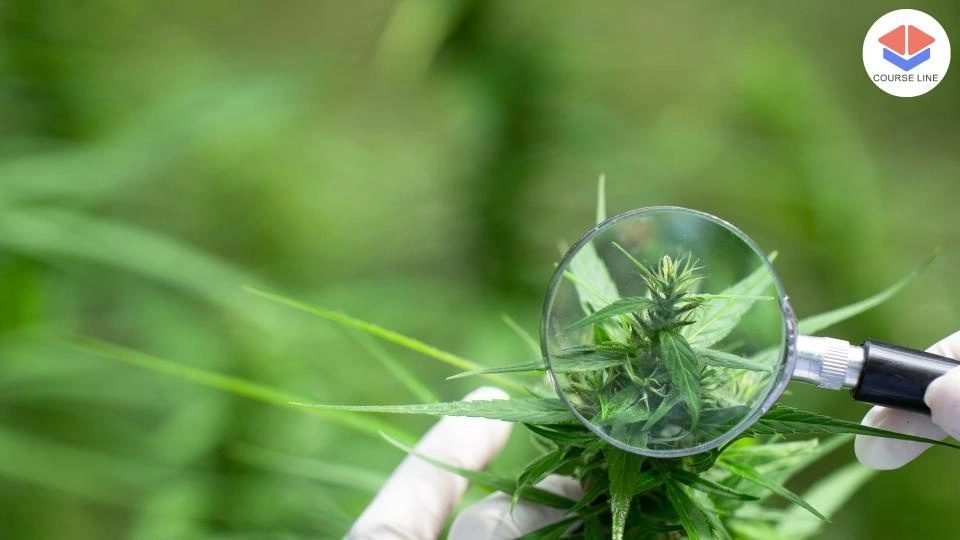Course Features
Price
Study Method
Online | Self-paced
Course Format
Reading Material - PDF, article
Duration
5 hours, 35 minutes
Qualification
No formal qualification
Certificate
At completion
Additional info
Coming soon
- Share
Overview
The Plant Pathology Level 3 Advanced Diploma is designed to provide a thorough understanding of plant diseases and their impact on agriculture. This course begins with an introduction to the history and importance of plant health, followed by an exploration of various plant pathogens, including fungi, bacteria, viruses, nematodes, and parasitic plants. Students will learn how to identify and classify common pathogens, focusing on prevalent diseases in the UK, and gain an understanding of the methods used to manage and control these threats to plant health.
Key modules also cover the environmental factors affecting plant diseases, including the role of climate change, and offer strategies to mitigate these impacts. Students will be introduced to integrated disease management (IPM), a critical approach that combines biological, physical, and chemical methods for effective disease control. The program further emphasizes plant disease diagnosis and health assessment, teaching students the latest diagnostic tools and techniques for monitoring plant health and conducting laboratory analysis.
The course also explores emerging challenges in plant pathology, such as new plant pathogens and the role of biotechnology in disease management. Practical application is a key component of the course, with field visits and laboratory work that allow students to directly observe plant diseases, participate in case studies, and apply their theoretical knowledge in real-world scenarios. This program equips students with the expertise needed to tackle plant disease management challenges in various agricultural and horticultural contexts.
Who is this course for?
The Plant Pathology Level 3 Advanced Diploma is designed to provide a thorough understanding of plant diseases and their impact on agriculture. This course begins with an introduction to the history and importance of plant health, followed by an exploration of various plant pathogens, including fungi, bacteria, viruses, nematodes, and parasitic plants. Students will learn how to identify and classify common pathogens, focusing on prevalent diseases in the UK, and gain an understanding of the methods used to manage and control these threats to plant health.
Key modules also cover the environmental factors affecting plant diseases, including the role of climate change, and offer strategies to mitigate these impacts. Students will be introduced to integrated disease management (IPM), a critical approach that combines biological, physical, and chemical methods for effective disease control. The program further emphasizes plant disease diagnosis and health assessment, teaching students the latest diagnostic tools and techniques for monitoring plant health and conducting laboratory analysis.
The course also explores emerging challenges in plant pathology, such as new plant pathogens and the role of biotechnology in disease management. Practical application is a key component of the course, with field visits and laboratory work that allow students to directly observe plant diseases, participate in case studies, and apply their theoretical knowledge in real-world scenarios. This program equips students with the expertise needed to tackle plant disease management challenges in various agricultural and horticultural contexts.
Requirements
The Plant Pathology Level 3 Advanced Diploma is designed to provide a thorough understanding of plant diseases and their impact on agriculture. This course begins with an introduction to the history and importance of plant health, followed by an exploration of various plant pathogens, including fungi, bacteria, viruses, nematodes, and parasitic plants. Students will learn how to identify and classify common pathogens, focusing on prevalent diseases in the UK, and gain an understanding of the methods used to manage and control these threats to plant health.
Key modules also cover the environmental factors affecting plant diseases, including the role of climate change, and offer strategies to mitigate these impacts. Students will be introduced to integrated disease management (IPM), a critical approach that combines biological, physical, and chemical methods for effective disease control. The program further emphasizes plant disease diagnosis and health assessment, teaching students the latest diagnostic tools and techniques for monitoring plant health and conducting laboratory analysis.
The course also explores emerging challenges in plant pathology, such as new plant pathogens and the role of biotechnology in disease management. Practical application is a key component of the course, with field visits and laboratory work that allow students to directly observe plant diseases, participate in case studies, and apply their theoretical knowledge in real-world scenarios. This program equips students with the expertise needed to tackle plant disease management challenges in various agricultural and horticultural contexts.
Career path
The Plant Pathology Level 3 Advanced Diploma is designed to provide a thorough understanding of plant diseases and their impact on agriculture. This course begins with an introduction to the history and importance of plant health, followed by an exploration of various plant pathogens, including fungi, bacteria, viruses, nematodes, and parasitic plants. Students will learn how to identify and classify common pathogens, focusing on prevalent diseases in the UK, and gain an understanding of the methods used to manage and control these threats to plant health.
Key modules also cover the environmental factors affecting plant diseases, including the role of climate change, and offer strategies to mitigate these impacts. Students will be introduced to integrated disease management (IPM), a critical approach that combines biological, physical, and chemical methods for effective disease control. The program further emphasizes plant disease diagnosis and health assessment, teaching students the latest diagnostic tools and techniques for monitoring plant health and conducting laboratory analysis.
The course also explores emerging challenges in plant pathology, such as new plant pathogens and the role of biotechnology in disease management. Practical application is a key component of the course, with field visits and laboratory work that allow students to directly observe plant diseases, participate in case studies, and apply their theoretical knowledge in real-world scenarios. This program equips students with the expertise needed to tackle plant disease management challenges in various agricultural and horticultural contexts.
-
- Understanding Plant Diseases 00:10:00
- Historical Overview of Plant Pathology 00:10:00
- Importance of Plant Health in Agriculture 00:10:00
-
- Identification and Classification of Fungi 00:10:00
- Common Fungal Diseases in the UK 00:10:00
- Management and Control of Fungal Pathogens 00:10:00
- Bacterial Diseases in Plants 00:10:00
- Viral Diseases in Plants 00:10:00
- Diagnostic Techniques for Bacterial and Viral Pathogens 00:10:00
- Impact of Environmental Conditions on Plant Health 00:10:00
- Climate Change and Plant Diseases 00:10:00
- Mitigation Strategies 00:10:00
- Tools and Techniques for Disease Diagnosis 00:10:00
- Monitoring Plant Health 00:10:00
- Laboratory Practices 00:10:00
- Field Visits to Observe Plant Diseases 00:10:00
- Hands-on Laboratory Work 00:10:00
- Case Studies and Projects 00:10:00
- Premium Certificate 00:15:00

No Reviews found for this course.
Is this certificate recognized?
Yes, our premium certificate and transcript are widely recognized and accepted by embassies worldwide, particularly by the UK embassy. This adds credibility to your qualification and enhances its value for professional and academic purposes.
I am a beginner. Is this course suitable for me?
Yes, this course is designed for learners of all levels, including beginners. The content is structured to provide step-by-step guidance, ensuring that even those with no prior experience can follow along and gain valuable knowledge.
I am a professional. Is this course suitable for me?
Yes, professionals will also benefit from this course. It covers advanced concepts, practical applications, and industry insights that can help enhance existing skills and knowledge. Whether you are looking to refine your expertise or expand your qualifications, this course provides valuable learning.
Does this course have an expiry date?
No, you have lifetime access to the course. Once enrolled, you can revisit the materials at any time as long as the course remains available. Additionally, we regularly update our content to ensure it stays relevant and up to date.
How do I claim my free certificate?
I trust you’re in good health. Your free certificate can be located in the Achievement section. The option to purchase a CPD certificate is available but entirely optional, and you may choose to skip it. Please be aware that it’s crucial to click the “Complete” button to ensure the certificate is generated, as this process is entirely automated.
Does this course have assessments and assignments?
Yes, the course includes both assessments and assignments. Your final marks will be determined by a combination of 20% from assignments and 80% from assessments. These evaluations are designed to test your understanding and ensure you have grasped the key concepts effectively.
Is this course accredited?
We are a recognized course provider with CPD, UKRLP, and AOHT membership. The logos of these accreditation bodies will be featured on your premium certificate and transcript, ensuring credibility and professional recognition.
Will I receive a certificate upon completion?
Yes, you will receive a free digital certificate automatically once you complete the course. If you would like a premium CPD-accredited certificate, either in digital or physical format, you can upgrade for a small fee.
Course Features
Price
Study Method
Online | Self-paced
Course Format
Reading Material - PDF, article
Duration
5 hours, 35 minutes
Qualification
No formal qualification
Certificate
At completion
Additional info
Coming soon
- Share
General Practitioner (GP) Level 3 Advanced Diploma
Course Line241£490.00Original price was: £490.00.£14.99Current price is: £14.99.Medical Secretary Level 5 Advanced Diploma
Course Line248£490.00Original price was: £490.00.£14.99Current price is: £14.99.KYC Essentials: A Complete Guide to Know Your Customer Compliance
Course Line242£490.00Original price was: £490.00.£14.99Current price is: £14.99.





